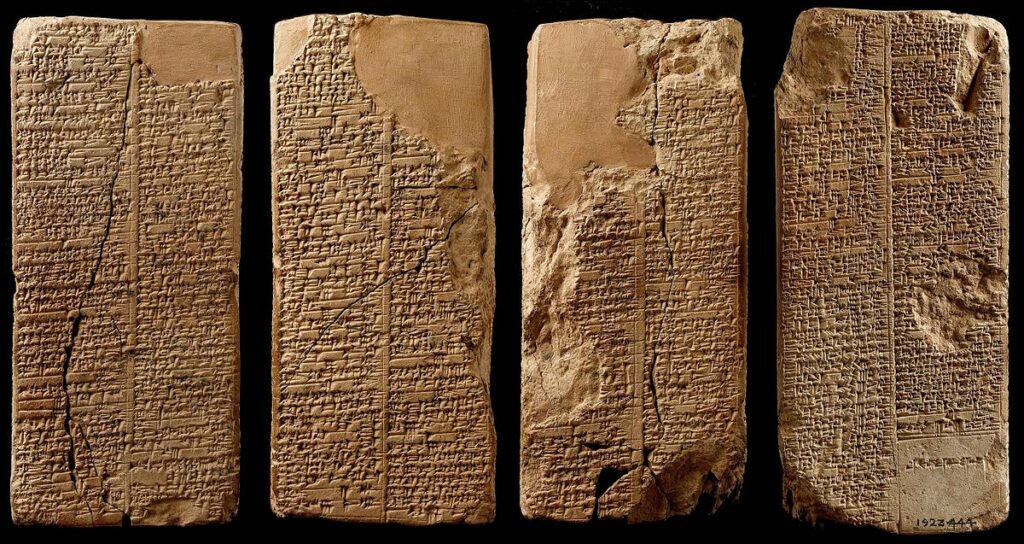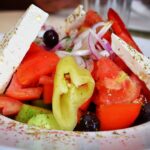The featured image above is called “The Sumerian King List,” which is a collection of ancient Sumerian Kings that had unusually long life span and ruled the different city-states of Sumer (modern day Iraq) in Southern Mesopotamia for thousands of years.
Archaeologists consider this cuboid-looking clay tablet a hoax or an exaggeration of the actual reign of their kings, because the clay tablet is dated only to the 3rd and 2nd millennium B.C.E. (Before Common Era), which would make it 4,000 – 5,000 years old. However, those in the Ancient Astronaut Community are saying that The Sumerian King List might be factual and true. Their reason is because archaeologists fail to divulge the information that the tablet itself is just a copy of an older version – and there might have been several versions dating back to 450,000 years ago!
Whether this is true or not, it’s up for debate and we do not dare dabble in things we have zero expertise about, but the point I’m making here is that these Sumerian kings had an incredibly long life span. But did you know that the Mediterranean diet can offer you longevity and enhance your life span as well? Of course, we don’t mean like those in the Sumerian King List like, say, for example, King En-men-lu-ana who ruled for a whopping 43,200 years (by the way, the list didn’t mention when they died or if they died at all)! No, we mean like above the current average of the human life span – 70 years old – and maybe even live up to a hundred.
Sounds interesting? Good! Keep reading.
What Causes People to Age?
The shortening of the telomeres at the ends of each chromosome is what causes people to age. Unfortunately, they get shorter every time your DNA chromosome makes a copy of itself, until one day the telomeres gets too short that the cells in your body can no longer replicate. Your cells with shortened telomeres die off and you along with it – eventually. Environmental factors, such as ultraviolet rays, poor diet, and alcohol, as well as psychological factors including stress, are putting our cells at risk of significant damage. These factors cause damage to the DNA in our cells, predisposing us to cancer and other diseases.
How the Mediterranean Diet can Give you a Long Life Span
The Mediterranean diet is an all-star nutrient-infused pattern of eating. Packed with heart-healthy olive oil, omega-3-filled fish and antioxidant-rich fruits and vegetables, this popular diet program can help improve blood vessel function, lower inflammation and reduce your risk of heart disease and cancer. According to a research that was published in the British Journal of Nutrition, people who follow the Mediterranean diet are 25% less likely to die off of age-related diseases. This, of course, means that your life span will obviously be prolonged because the food you consume makes your body optimally healthy.
To some extent, when it comes to healthy aging, our diet is the main contributor to all age-related illnesses. The CDC (Centers for Disease Control and Prevention) reports that 1 out of every 4 Americans die from heart disease, which is the leading cause of death in the United States. Obesity, high cholesterol, high blood pressure, and poor diet have been found to be the top risk factors for CVD (cardiovascular disease). The rise in obesity has hit the United States hard. Over a third of adults and about 1/5th of children and teens ranging from the age of 2 – 19 are suffering from obesity.
Research shows that by simply switching from an unhealthy diet to a healthy one can make a big difference between health and illness, and sometimes even between life and death. Lesser illness due to your diet will mean having a longer life span. For more than half-a-century, scientists who have done research on how our diet affects our health have praised the virtues of the Mediterranean diet, as the food groups it emphasizes people to eat contain all the essential vitamins and minerals that the human body needs.
Recommended Reading: Adherence To Mediterranean Diet And Health Status Meta-Analysis
Role of the Microbiome
According to science, approximately 60 tons of food passes through the average human’s digestive tract in a lifetime, which exposes our intestines to billions of different bacteria, not to mention the ones that we are born with (good gut bacteria). Most of those tiny life forms play an important role in how efficient we absorb nutrients; keeping our immune system in good condition; and keeping our energy and metabolism levels balanced.
The amount and types of microbes found in the gut are reduced as we age and this can negatively impact our health. Those who live alone and elderly people living in home for the aged facilities have one thing in common – poor diet. In some cases, the reason why elderly people don’t have a well-balanced diet is because of their poor health and dental problems.
With the diversity of bacteria having been diminished over time, inflammation occurs which results in age-related inflammatory processes that can cause cancer, neurological disorders and other diseases. This will also affect your life span.
What Does the Research on Aging and Longevity Say?
As far back as the 1950s scientists have been studying how to increase the human life span beyond 100 years old. Early technology developed to prolong human life is cryogenics. Cryogenics is the science that addresses the production and effects of very low temperatures. One procedure is called cryopreservation where your head is severed from your body when you die and kept inside a cryogenic tank to be revived in the future when the cloning and/or genetic engineering has been perfected, and scientists could create a new body for your head – then reattach your severed head to your new body.
Another way of expanding the human life span is by consuming more antioxidants. Antioxidants gets rid of free radicals which can damage your DNA, shorten your telomeres and cause you to age and die. In an experiment, a tiny worm was given antioxidants and it was able to live 3 times longer than its normal life span! Scientists claim the same effects can be seen in human beings if administered with antioxidants without giving an over dosage.
Some scientists suggest that if we suppress the genes that causes inflammation, we can help the human body heal faster and live longer. Highly consistent driver genes such as HCK, CD53 and TYROBP have been found being involved in many inflammation-related disorders. But don’t hope to become like the X – Men superhero, Wolverine though because it will take a lot more new scientific breakthroughs before we can achieve a super healing factor like that in the human body.
This study claims that researchers have found synergistic cellular pathways that if they can control it, then it could make humans live 5 times longer than the current average life span of today! What a treat! Who wouldn’t want to be on the receiving end of this medical treatment, right? But there are still a lot of puzzles to be solved, so in the meantime let’s just follow the Mediterranean diet to prolong our life span.
Meanwhile, in the holistic medicine, holistic experts believe that sound can also heal the body and extend human life. Ancient astronaut theory proponents believe that the Hypogeum Hal Safleini in Malta is an acoustics chamber designed to heal the human body. Imagine if you combine the Mediterranean diet and visiting this chamber once a month, how long would you be able to live? I’d definitely want to do that if it will make a difference in my life!








5 Responses
Thanks for the good article, I hope you continue to work as well.
WHOA! Those Sumerian kings are gods! So, you’re saying that I can become immortal too if I follow the Mediterranean diet?
Interesting article!
I want to live a long life too! Thanks for this article.
So the passage in Genesis about God worrying that man could become immortal is somewhat true? LOL! You have great insight, thanks!